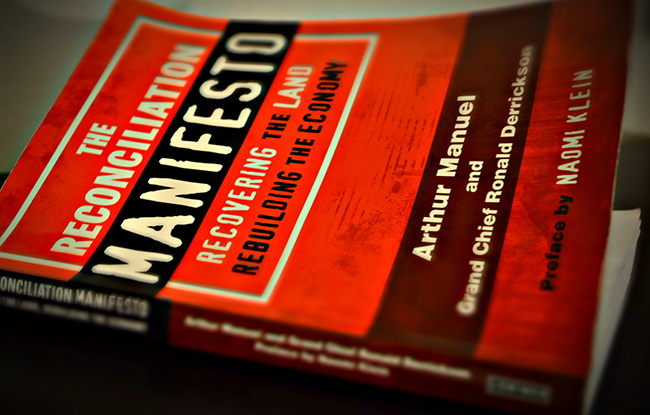The Reconciliation Manifesto: Debunking Nice Canadian Myths and Moving Forward

By Erica Commanda
In the words of Arthur Manuel, “to truly reconcile Aboriginal and Crown title, Canada and the provinces would first have to recognize and affirm our Aboriginal and treaty rights on the ground.” This is repeated several times throughout Manuel’s The Reconciliation Manifesto: Recovering the Land and Rebuilding the Economy. He repeats important information like this throughout the book, I feel, to get his point across.
There are no mincing of words here. Manuel lays all the cards on the table. He explains the complexities of racism, its roots in a legal charter issued by Pope Nicholas V in 1452, how it’s systemic and normalized in not only Canadian society, but in Canadian policy and law.
The Reconciliation Manifesto debunks the widely believed myth that Canada is not a racist nation. That Canada is a tolerant nation. Just because white people are nice to other white people, it doesn’t mean that racism is non-existent. There is such thing as being nice and racist. Have you ever heard a nice white person say: weren’t you just killing each other all off anyways? Conquering other societies has been a part of this world forever, who cares? We stole this land fair and square, and other casually racist phrases nice white settler Canadians like to say when talking about Indigenous issues.
Manuel also calls out the current Liberal government’s co-opting of reconciliation in order to achieve the extermination of Indigenous rights and carrying on the work of the Conservative and Liberal governments before them. The Canadian Prime Minister is really good at marketing and putting on a great act. “[Justin Trudeau] can cry a tear, almost at will, for our pitiful state, but he is as ruthless as the others in keeping us there with his inherited extinguishment policies that seize our land and leave us in poverty and despair,” explains Manuel.
Despite the tough topic subject matter, Manuel writes all of this in an easy to understand way that can still unfortunately be applied to the ongoing news events of today: the BC NDP’s approval Dam Site C despite protests from Indigenous people, the surprise splitting of Indigenous and Northern Affairs Canada to name a couple. All of this reinforces that this colonial system is not meant for Indigenous people to flourish by our own means.
It’s not all doom and gloom, although it can seem that way at the beginning of The Reconciliation Manifesto. That’s just because Manuel has to explain what Indigenous people have been up against for the last 150+ years. He’s a solutions person. Part of his legacy is creating the building blocks for a better society, where Indigenous people are no longer oppressed and we all can prosper on this land. The latter part of the book speaks to this.
The power is in the people. While we do have an uphill battle, education through books like this and Indigenous lead movements like Idle No More and Defenders of the Land can help lead society in actual reconciliation, recovering the land and rebuilding the economy for all of us to benefit. Manuel states,“In defending the land…we are defending something much larger than Indigenous rights. Our fight today is to preserve the planet in a livable form.”
In the end of it all, this also begs the questions: when will we learn that politics is just a facade to maintain the status quo of the rich and elite who don’t care for the future of this planet or next seven generations that are going to live on it? And what can we do about it?


